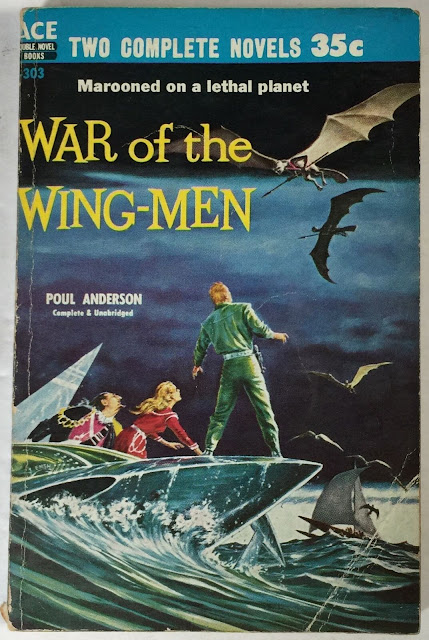"War of the Wing Men" aka "The Man Who Counts" by Poul Anderson
This is a novel of roughly 50,000 words. It was serialized in early 1958 in Astounding as "The Man Who Counts". It was reprinted as War of the Wing-Men in some later Ace editions, but in 1978 it was republished as The Man Who Counts, both in itself by Ace and as part of the big Berkley collection The Earth Book of Stormgate. So that title, not surprisingly, must have been Anderson's choice. I've done a cursory comparison of the Astounding serialization and the Ace Double printing, and they appear to be essentially identical, save a few words changed presumably by one editor or the other ("tensed" for "tautened" is one example).
War of the Wing-Men is set on Diomedes, a somewhat unusual planet. One of the important features include considerable size (twice the diameter of Earth) but very low density (because there are no heavy metals), leading to a combination of gravity and air pressure that makes flight possible for fairly large animals. Another key feature is an axial tilt of nearly 90 degrees, meaning that for much of the planet the sun never rises in winter and never sets in summer. The upshot is that the intelligent natives are winged, have a technology that must do without metal, and generally need to migrate seasonally.
Nicholas van Rijn, a "merchant prince" of the Polesotechnic League, has come to Diomedes to check on his trading post there, which is run by Eric Wace. They are accompanied by Sandra Tamarin, the Crown Princess of the planet Hermes. (Need I mention that she is a tall, busty, face too strong to be beautiful, r/e/d/h/e/a/d/ er - blonde?) As the action opens the three of them are marooned on the seas of Diomedes after the sabotage of their airship, with only a few months food at most. (The proteins of Diomedan life are poisonous to humans, and vice-versa.) They have landed near a Diomedan race that lives on ships, and calls themselves the Drak-ho (sometimes, shades of Stirling, the Draka), or Fleet. The Fleet is engaged in a war with a land-based race called the Lannachska, or the Flock. Representatives of the Fleet pick up the three humans, but it soon becomes clear that they have little interest, and perhaps not the ability, to contact the human trading post to arrange for rescue. Van Rijn sizes up the situation quickly, as well as the political strife among the Drak-ho, involving an aging and respected Admiral, his foolish violent son, and his capable but lower-born Captain. Van Rijn tricks the Drak-ho into a situation which causes the humans to be kidnapped by the Lannachska.
Once among the Flock, Van Rijn begins to assist them in their to this point desperate and losing war against the Fleet, in exchange, he hopes, for help in contacting the traders' post. In so doing he demands heroic efforts from Wace, Sandra, and the Flock, and he rubs a lot of fur the wrong way among the Flock, who are unready to adjust their habits in the ways necessary to give them a chance to defeat the Fleet. He also enrages Wace, who perceives Van Rijn as a lazy glutton who does nothing but eat and boss people around. There is also a mystery to be solved concerning the key social difference between the Flock and the Fleet. The former, like humans, are always sexually ready, and form marriages and have babies all year round. The latter, like most Diomedans, only go into heat once a year, after their migration to warmer lands in winter, and all babies are born at the same time have been conceived in orgy-like situations during the winter celebration. Mothers rarely know who the fathers of their babies are, and the social structure is basically a clan, with the children raised communally. Both groups consider the other's habits truly disgusting -- one reason they are at war.
The resolution is pretty nice, involving brilliant tactics by Van Rijn, heroics by many including the "good" Captain of the Fleet, and the solution to the sexual mystery. (Other aspects of the world-building come into play nicely as well.) I wasn't wholly convinced. Van Rijn's uses of Shakespeare's St. Crispin's Day speech to rally the Flock to action seemed implausible in its effect. (I kept thinking of William Sanders's "The Undiscovered", where William Shakespeare writes Hamlet while marooned among American Indians, and they just don't get what he's trying to do. If other humans won't "get" Shakespeare, why would these aliens?) In general the success of Van Rijn's schemes seemed to be a result of quite remarkable luck half the time -- but that's par for the course in many an adventure novel. And the lecture at the end of the novel, about who the man is who really "counts": the engineer/hard worker like Wace or the leader/schemer like Van Rijn, seemed to ram home a point already well enough made. But overall this is a good solid novel, a fun read with some clever SFnal worldbuilding well integrated with the plot. (Strange At Ecteban)


Comments
Post a Comment